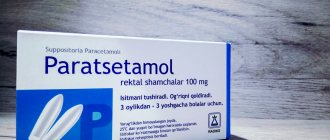What can cause fever?
The temperature can rise in any trimester of pregnancy. Unfortunately, there is no absolute protection against this. Temperature surges can be caused by:
- The pregnancy itself, which is associated with hormonal changes occurring in the expectant mother. Thus, during the 1st trimester, increased secretion of progesterone is observed. This is important to ensure the safety of the fertilized egg. At the same time, it suppresses the immune system, which causes a slight (up to 37.5°C) increase in temperature.
- Viruses and infections provoke ARVI, influenza and other types of colds. Due to the weakened function of the body's defenses (as discussed above), pregnant women are more susceptible to such diseases. Their occurrence is inextricably linked with an increase in temperature. In addition, other symptoms may appear. These include headaches, runny nose, body aches, drowsiness, and cough.
- Pyelonephritis in pregnant women (inflammation of the kidneys) is a common occurrence associated with infection. Fetal pressure impedes the normal circulation of waste products. As a result, infection occurs. The disease is accompanied by an increase in temperature, pain below the lower back, pain when visiting the toilet, weakness and headaches.
- Intestinal infection is manifested primarily by nausea, which is similar to toxicosis. It is accompanied by sharp abdominal pain, frustration and fever.
Causes of fever in pregnant women
Often, immediately after conception, a woman notices jumps in her basal temperature. This is due to the variability of hormonal levels in the first trimester of pregnancy, when the placenta is not yet fully formed, and the formation of the internal organs and vital systems of the unborn baby occurs very rapidly. In such cases, there is no need to resort to medication.
An increase in body temperature is a natural protective mechanism of every living organism, when the immune system makes it clear that it is fighting an attacking infection. Of course, such conditions are extremely undesirable for a pregnant woman, especially in the early stages of embryonic development. In the first trimester of pregnancy, the immune system is most vulnerable, because the main forces and resources of the mother’s body are aimed at the formation of the fetus and placenta.
Traditional methods of eliminating fever
Often, immediately after conception, a woman notices jumps in her basal temperature. This is due to the variability of hormonal levels in the first trimester of pregnancy, when the placenta is not yet fully formed, and the formation of the internal organs and vital systems of the unborn baby occurs very rapidly. In such cases, there is no need to resort to medication.
An increase in body temperature is a natural protective mechanism of every living organism, when the immune system makes it clear that it is fighting an attacking infection. Of course, such conditions are extremely undesirable for a pregnant woman, especially in the early stages of embryonic development. In the first trimester of pregnancy, the immune system is most vulnerable, because the main forces and resources of the mother’s body are aimed at the formation of the fetus and placenta.
How to choose an antipyretic in the first trimester is a rather difficult question. When the body temperature rapidly rises and a woman begins to feel general weakness caused by a cold infection, it is necessary to immediately decide how to deal with the progressive disease. Feverish conditions accompanied by an increase in body temperature can be of various origins:
- bacterial;
- viral;
- allergic;
- hormonal.
In each of these conditions, the immune system enters into a “battle” with a pathogenic infection that has entered the body. The thermoregulation system, in turn, is dynamically rebuilt by the release of special compounds, pyrogens, which cause fever.
Pregnant women, especially in the early stages of embryonic development, should take medications to reduce their temperature only in the most critical situations. In the first trimester, a temperature of up to 37.5°C is considered quite common. Such a jump in temperature occurs against the background of hormonal changes in the mother’s body, when the synthesis of the hormone progesterone increases in the early stages.
A viral or bacterial infection manifests itself completely differently. The pregnant woman and the embryo are at high risk from infectious diseases such as:
- angina;
- flu;
- herpevirus;
- intestinal infections;
- inflammation of internal organs.
High temperature in the first trimester can disrupt placental development, cause abnormal development of the embryo, and provoke miscarriage. You should seek help from a doctor as soon as possible if a pregnant woman experiences the following rapidly progressing symptoms, accompanied by an increase in body temperature:
- high fever;
- nasal congestion;
- sore or sore throat;
- sneezing;
- stomach pain;
- intestinal colic;
- diarrhea;
- dizziness;
- general weakness;
- pain in the lumbar region.
Antipyretic drugs called antipyretics are used to reduce fever. Usually, preference is given to non-steroidal drugs that have anti-inflammatory and analgesic effects at the same time. In any case, antipyretics should be taken with great caution in the first trimester of pregnancy.
| Antipyretic drugs | |||
| Not recommended for pregnant women | Acceptable for pregnant women | ||
| A drug | Indications, consequences | A drug | Indications, consequences |
| "Nurofen" | Antipyretic anti-inflammatory analgesic. The expected effect occurs 2-3 hours after administration, prolongation of action is 5-6 hours. May cause uterine contractions, bleeding, miscarriage. | "Panadol" | Fast-acting effective analgesic. Contains paracetamol. It is not recommended for early pregnant women who are prone to allergic reactions; it can cause exacerbations of chronic kidney and liver diseases. Daily intake should not exceed 1200 mg. |
| "Ibuprofen" | A fast-acting analgesic with moderate antipyretic activity. It is not recommended for use in the early stages of pregnancy. May cause fetal freezing or miscarriage. | "Tylenol" | An effective analgesic that has a rapid effect on pain centers and also quickly relieves fever. The fractions of the drug ingredients do not have a negative effect on the embryo, maintaining a stable water-alkaline balance in the mother’s body and without irritating the mucous membranes of the gastrointestinal tract. |
| "Dopamine" | A highly effective analgesic with antipyretic and analgesic effects. It is not recommended for use by pregnant women due to its belonging to the adrenergic group. Capable of rapidly increasing muscle and vascular tone, activating processes occurring in the central nervous system. May cause uterine contractions, premature birth, and shock. | "Efferalgan" | An effective analgesic that has a rapid effect on pain centers and also quickly relieves fever. The fractions of the drug ingredients do not have a negative effect on the embryo, maintaining a stable water-alkaline balance in the mother’s body and without irritating the mucous membranes of the gastrointestinal tract. |
| "Alvedon" | A highly effective analgesic that quickly reduces high basal temperature. It is not recommended for use at different stages of pregnancy due to the amidopyrine fractions included in the composition. In pregnant women, it can cause a number of side effects, leading to the death of the embryo, disruption of the functioning of hematopoietic cells, and allergic reactions. | "Paracetomol" | An effective antipyretic and analgesic drug. It can be used almost throughout pregnancy. It is considered one of the safest analgesics for the maternal body during gestation, as well as for the embryo. |
We suggest you read: Rinonorm can be dripped into the nose for pregnant women.
Almost all medications carry risks for the child and mother. But you need to fight the temperature if it is very high. What can pregnant women drink if they have a fever? The only group of drugs that can be taken by pregnant women are paracetamol-based drugs. There are quite a lot of them. For example, Paracetamol Extra, Panadol, Tylenol, Paracet, Efferalgan.
The use of such products is allowed during pregnancy, but there are still risks. Scientific studies show the possibility of liver and kidney problems. Therefore, the reception must be balanced and careful. It is recommended to start with half a tablet, even in case of urgent need. Taking paracetamol during pregnancy should be sporadic.
In the early stages of pregnancy, a slight increase in temperature is not dangerous, so you can use folk remedies to reduce it. It is important to take into account your general health and the presence of other symptoms. If there are any, it is better to consult a doctor.
What can be done from traditional medicine for fever during pregnancy? The first step is to drink plenty of fluids. This is permissible in the first trimester. In the second, third, such a remedy can lead to swelling. Therefore, it is worth monitoring fluid intake, and it is better to resort to other methods of treatment.
For drinking it is recommended to use:
- warm milk with honey;
- tea with lemon and sugar;
- weak decoctions of chamomile or linden;
- fruit drinks;
- raspberry tea.
The drink should be warm, but not hot. The proposed drinks are very easy to prepare. They lower body temperature well, strengthen the body and have an anti-inflammatory effect. If you have an allergic reaction to the components of the drinks, you should refrain from using them. The amount of liquid consumed should reach two liters. This will provide an antipyretic effect. But do not forget about possible swelling.
To get rid of fever during pregnancy, it is important to remember the dangers of overheating. You should not wrap yourself up if your health allows. After removing excess clothing, you can use apple cider vinegar. This technique allows you to effectively lower your temperature by accelerating sweating and heat transfer.
An alternative to rubbing can be a cold compress on the head or a cabbage leaf. This treatment does not harm the baby. But you also need to be careful with a cold compress. The body has an elevated temperature, and cold is applied to it. This causes vasospasm, which can adversely affect the mother's condition. The safest remains the cabbage leaf, which is capable of drawing out excess heat and transferring it to itself.
During pregnancy, it is not recommended to steam your feet, which is sometimes used for fever. Also, you should not drink calendula decoction. This can only make the situation worse.
When the temperature rises significantly, herbal tea is used. To prepare it you will need plantain leaves, oregano, coltsfoot and raspberries. The proportion should be 3:2:4:2 respectively. The decoction should be drunk 4 times a day, a tablespoon.
A decoction of white willow bark also helps bring down the temperature. It needs to be crushed and brewed with boiling water. For 1 tsp. bark will need a glass of water. It should be taken chilled, one tablespoon 4 times a day.
An effective antipyretic traditional medicine is a pine cocktail. It contains the following ingredients: raspberry root (50 g), pine buds or fir shoots (100 g). Everything needs to be crushed, put into a glass vessel and covered with sugar. Next, add a tablespoon of boiling water. The cocktail is left for a day, after which it is simmered in a water bath for 6-8 hours.
We suggest you read: Is it possible for pregnant women to use star balm?
Non-drug remedies
If the temperature rise is caused by an uncomplicated cold, you can try to reduce it using non-drug measures.
It is recommended to drink plenty of warm drinks, for example, a decoction of rose hips, strong tea with lemon and honey, cranberry or lingonberry fruit drinks. You can wipe it with a vinegar solution. For this procedure, you need to dilute 50 ml of vinegar in 150 ml of warm water. You can also try to reduce the temperature by using a cold compress or cabbage leaf on your forehead. How Simply Recommends Why the medicine doesn’t work The key to successful treatment is, of course, following all the doctor’s recommendations and informing him of all significant changes during therapy. However, a specialist can talk as much as he wants about the regimen and duration of taking the drug, but most patients will still violate these rules. Read more
Possible consequences of high temperature
If in the first stage of pregnancy there is an increase in temperature to 37.5 ° C, there is no need to worry too much. But when it starts to approach 38°C, risks for the fetus appear. Its proper development and formation becomes threatened. The first trimester is characterized by the intensive structure of a new organism.
Exceeding 38°C is fraught with disruption of protein production. This leads to poor blood circulation. Oxygen starvation can cause miscarriage (in the early stages) or premature birth (in the later stages). There are also increased risks in the last weeks of pregnancy. For a woman, a high temperature can result in problems with the nervous system and heart, and for a child - in infection during childbirth.
Huge risks require a clear understanding of how to lower your temperature during pregnancy. It is important to quickly identify the causes and eliminate them. Do not forget about the possible harm of self-medication. It is better to contact specialists immediately.
What temperature is better not to lower, and what temperature should you use?
Since elevated temperature is the body’s natural fight against pathogens, it is not always necessary to bring it down. If the thermometer value does not exceed 37.5 degrees, do not rush to take medications.
Let's consider situations when it is simply necessary to lower the mercury indicator:
- the temperature is approaching or has already exceeded 38 degrees,
- in later stages, a dangerous indicator is 37.5,
- does not go away after a few days and cannot be treated with traditional medicine,
- hyperthermia is caused by a sore throat or other bacterial microflora.
Before you begin to act, you need to find out the exact reason for the appearance of such a reaction in the body.
When and how can you lower your temperature during pregnancy?
It is necessary to reduce body temperature in the following cases:
- if its level exceeds 38°C;
- with angina (intoxication of the body caused by the disease carries extremely high risks for the mother and child);
- when traditional methods do not produce results;
- if medications do not stop the increase;
- at a temperature of 37.5°C, in case of late pregnancy.
The appearance of a temperature and its rapid increase should cause concern for a pregnant woman. It is important to consult a doctor promptly for advice. If the mark of 37.8°C is reached, it is best to start knocking it down and immediately be examined by a gynecologist and specialists (if necessary). This is the only way to identify the true reasons that caused the temperature jump. Self-medication is not recommended. During pregnancy, the risks are very high. Moreover, not only the mother suffers, but also the child.
The progesterone mentioned above cannot affect body temperature in the second half of pregnancy. Therefore, its increase during this period indicates the presence of an inflammatory process or infection. If the temperature is accompanied by sharp pain, vomiting, or feeling unwell, you should call an ambulance. This is the only way to protect yourself and your child from serious consequences.
We have discussed the importance of consulting a doctor. But when the temperature is very high, it is sometimes recommended to begin to bring it down even before the ambulance arrives. It is important to understand what pregnant women can do for fever, and what can harm or worsen the situation. Let's start with dangerous medications.
Everyone knows that the main remedy for fever is antipyretic drugs. But are they all harmless? Pregnant women are not recommended to use medications that have a teratogenic effect. They can provoke various abnormalities in fetal development. Also, a side effect of some drugs is the occurrence of bleeding, which is extremely dangerous for a woman.
Aspirin and other drugs based on it are considered the most dangerous medications. Acetylsalicylic acid In early pregnancy, it poses a threat to the development of defects in the child and can provoke a miscarriage. At a later stage, its use quite often causes intrauterine bleeding.
Drugs based on ibuprofen are dangerous for use in the last trimester of pregnancy. They can provoke the development of kidney problems in the child and bleeding in the mother. Also, such drugs complicate labor and increase its duration. To reduce fever during pregnancy, you can use them only in the early stages if the risk is less than the benefit of use.
Antibiotics can also cause complications during pregnancy. They can only be taken as prescribed by a doctor and very carefully. It is often recommended to start taking half a tablet.
This can be called Ibuprofen, which is an excellent antipyretic. But it is better for pregnant girls to use it with caution, and only in the third trimester. The fact is that in the early stages it can lead to miscarriage, and in the last week before childbirth it can affect the uterus, or rather, its contractions during the birth process.
We suggest you read: Can pregnant women drink acetylsalicylic acid?
But if the expectant mother does not accept any medications at all or is very worried about their effect on the child in the womb, doctors recommend turning to traditional medicine.
Raspberries or black currants, honey and lemon, brewed linden infusion and warm tea will help you sweat and give your immune system additional support from beneficial microelements, minerals and vitamins. You will have to drink a lot of warm liquid, and most importantly, do it more often. Contrary to the belief that it is necessary to wrap up and barricade windows and doors, preventing fresh air, ventilate the room and dress lightly.
In a cool room, the body will feel lighter, and the surrounding room temperature will help to slightly reduce the body temperature. If suddenly a sore throat characteristic of a cold and sore throat appears, a consultation with a doctor must be carried out.
If, apart from a slight fever and headache, there are no symptoms, then it is better to take No-shpu or Papazol. This is relevant in the first trimester, and in the second, regular Valerian, in tablets or solution, will help. That is, it is better to get rid of painful sensations in the head with the help of elementary antispasmodics.
Safe antipyretics for pregnant women
Almost all medications carry risks for the child and mother. But you need to fight the temperature if it is very high. What can pregnant women drink if they have a fever? The only group of drugs that can be taken by pregnant women are paracetamol-based drugs. There are quite a lot of them. For example, Paracetamol Extra, Panadol, Tylenol, Paracet, Efferalgan.
The use of such products is allowed during pregnancy, but there are still risks. Scientific studies show the possibility of liver and kidney problems. Therefore, the reception must be balanced and careful. It is recommended to start with half a tablet, even in case of urgent need. Taking paracetamol during pregnancy should be sporadic. Only a doctor can determine the correct dosage. Therefore, if you have a high temperature, you should take half a paracetamol-based tablet and call a doctor immediately.
Is it possible to do without medications?
The safest way to reduce fever during pregnancy is to drink plenty of warm fluids. Taking increased volumes of liquid can cause swelling. If you drink liquid to achieve an antipyretic effect, you can increase sweating. A pregnant woman should independently control her reactions to increased fluid intake.
It is advisable to saturate teas and drinks with natural vitamins and microelements. You can add raspberries, black currants, a slice of lemon, red viburnum berries or cranberries to tea. Infusions of plantain leaf, rose hips, coltsfoot, oregano, chamomile flowers, and creeping thyme will give the expected effect. However, even at first glance, fairly safe medicinal herbs during pregnancy should be treated with extreme caution.
Preventive measures
All of the above antipyretic methods of traditional and folk medicine allow you to understand how to bring down the temperature of a pregnant woman. But is it possible to prevent its occurrence? In many cases, yes, if you follow some tips to prevent fever:
- it is important to avoid places where large numbers of people are concentrated (especially during cold seasons and periods of epidemics of colds);
- ventilate the room several times a day every day;
- be sure to wash your hands with soap and clean your nasal passages after coming home from the street;
- monitor proper nutrition (healthy food with proper heat treatment can prevent infections that affect the intestinal tract);
- dress according to the weather, avoid hypothermia and overheating;
- take vitamins and medications to strengthen the immune system (as prescribed by a doctor).
Thus, fever during pregnancy in most cases has many risks for both the mother and the fetus. It is important to act quickly. Before lowering the temperature of a pregnant woman, you should consult a doctor. He will not only be able to make a diagnosis, but will also prescribe complete, safe treatment and correct dosages.
Tags: pregnancy, antipyretic, can, drink
About the author: admin4ik
« Previous entry
Medications
There are several ways to lower your temperature. This includes taking medications and traditional medicine methods.
Unfortunately, many medications are prohibited for pregnant women because they can negatively affect the fetus. For example, it is strictly not recommended to drink tablets containing aspirin. In fact, pregnant women are only allowed to take drugs containing paracetamol, but even these must be taken with caution and in small quantities (no more than three tablets per day). You should also consult your doctor before starting to use them. If the temperature is not high, the doctor may prescribe homeopathic medicines to avoid unnecessary risk.










